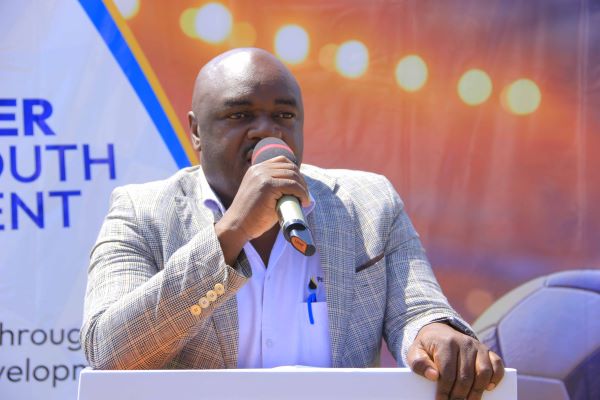HOIMA, December 14, 2024 – Officials from Bunyoro Kitara Kingdom have been urged to engage with the youth and discourage them from being used to disrupt the ongoing oil development activities in the Albertine Graben that has oil fields.
Sam Mugisa, the Social Affairs Coordinator at the Petroleum Authority of Uganda [PAU], expressed concern over the influence of certain individuals who are offering small sums of money to the youth to oppose the oil projects in the area.
Mugisa’s warning came just days after a group of Project-Affected Persons [PAPs] from Kikuube and Hoima districts held protests against the East African Crude Oil Pipeline [EACOP]project. Over 100 men and women, carrying placards with messages such as “No to land grabs,” “No to eviction,” “No to environmental harm,” “No to EACOP,” “Stop EACOP,” and “Chinese financial institutions should stop funding EACOP”, claimed that human rights violations and environmental degradation were occurring as part of the oil projects.
The protestors demanded an immediate halt to the EACOP project to allow their grievances to be addressed. They also called for the protection of national parks and biodiversity, stressing that oil activities in protected areas should cease to preserve the environment for future generations. Additionally, the PAPs called for an end to the arrest and harassment of grassroots environmental and human rights defenders advocating for the rights of affected communities.
Barak Bakundane, one of the PAPs, condemned what he referred as environmental destruction, particularly during the critical phase when the Albertine region and Uganda as a whole are transitioning to the oil production stage.
Innocent Tumwebaze, another PAP, explained that while the government had acquired land for the project, compensation had not been fair. He emphasised that the compensation issues needed to be addressed first and warned that the environmental impact, such as encroachment on wetlands, water sources, and deforestation, could have long-lasting negative consequences. Tumwebaze further highlighted the risk of oil spills and other hazards that could threaten ecosystems and the livelihoods of local communities.
Sarah Natukunda, another individual affected by the EACOP project, added that the compensation provided was insufficient. While acknowledging the potential short-term benefits of the project, such as job creation and infrastructure development, she stressed that these would be outweighed by the long-term environmental and social costs.
However, Mugisa, who was in Hoima to represent PAU Executive Director Ernest Rubondo at the launch of the Bunyoro-CNOOC Amasaza Cup Tournament on Tuesday, dismissed the claims made by the protestors as unfounded. He suggested that the actions of the group were being fueled by enemies of Uganda’s oil and gas sector. Mugisa challenged leaders in the Bunyoro subregion to engage the youth and help them understand the importance of oil and gas development for Uganda’s economic transformation.
“I advise the youth to engage in activities that will benefit them. We are already seeing the positive outcomes of oil and gas development, such as improved roads, the construction of airports, and many other benefits. We need to sensitize the youth so they are not misled by small amounts of money from foreign groups that do not want African countries to develop,” Mugisa said.
He emphasised that the EACOP project is being implemented with environmental sustainability in mind and that the concerns raised by activists are being addressed.
The EACOP, a 1,443-kilometer pipeline, will transport Uganda’s crude oil from Hoima district to the Chongoleani peninsula near Tanga Port in Tanzania. The project is a joint venture involving the governments of Uganda and Tanzania [represented by Uganda National Oil Company [UNOC] and Tanzania Petroleum Development Corporation [TPDC], as well as Total Energies and China National Offshore Oil Corporation [CNOOC] under the company EACOP LTD.
The pipeline will pass through various Ugandan districts, including Hoima, Kikuube, Kakumiro, Kyankwanzi, Mubende, Gomba, Sembabule, Lwengo, Kyotera, and Rakai, before crossing into Tanzania between Masaka and Bukoba, continuing through Kahama, Singida, Kondoa, and ending in Tanga.
https://thecooperator.news/eacop-locals-supported-with-post-harvest-handling-materials/
Buy your copy of thecooperator magazine from one of our country-wide vending points or an e-copy on emag.thecooperator.news
